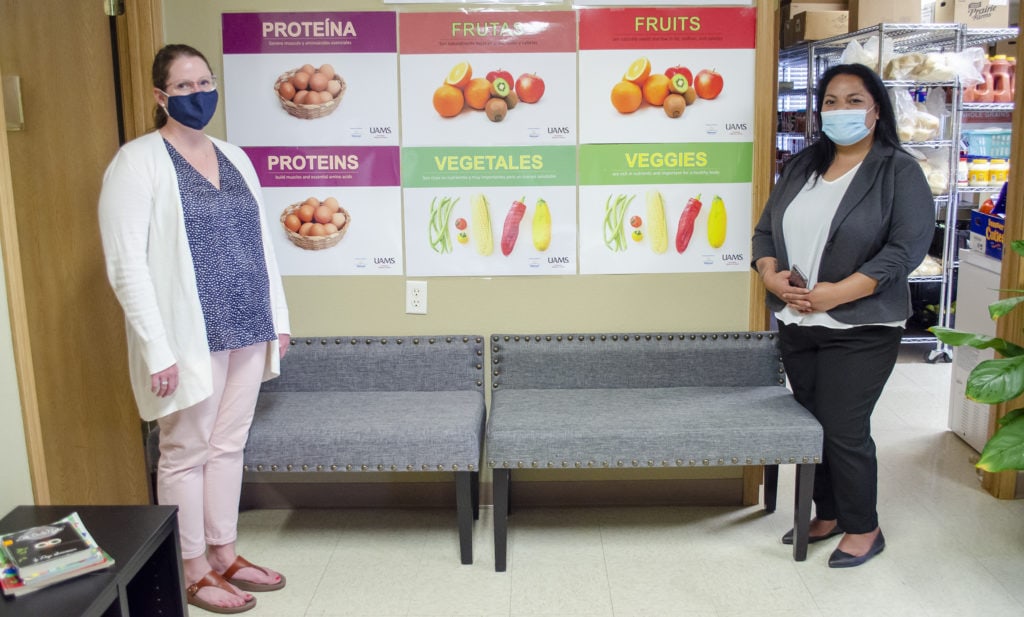
At a Glance
Latinx and Marshallese families in Northwest Arkansas have been disproportionally affected by Covid-19. The University of Arkansas for Medical Sciences (UAMS) has leveraged existing community partnerships created through the CDC’s Racial and Ethnic Approaches to Community Health (REACH) grant to support and coordinate the establishment of two pantries. The pantries are posed to serve Latinx and Marshallese families, offering culturally appropriate food and addressing known barriers such as language, lack of safe environment for receiving services, transportation, and paperwork. When fully launched, the pantries will have the potential to serve approximately 1,450 families a month.
Public Health Challenge
According to Feeding America’s 2018 Map the Meal Gap report, one in every six people in Arkansas struggled with hunger1. This figure is projected to rise to nearly one in four people in 2020 due to COVID-19 and the ripple effects it has had on Arkansas’s community health and economy2. In Northwest Arkansas – particularly Benton and Washington counties – the Latinx and Marshallese communities have been disproportionately affected by the virus. Demographic data from the Arkansas Department of Health in August 2020 show the Latinx population have a nearly three times higher rate of infection as the state average, while the Marshallese population infection rate is more than ten times higher3.
Prior to COVID-19, these communities already experienced high rates of food insecurity and chronic illness4. Legal status, language, culture, and transportation present barriers for these communities to accessing food pantries and assistance. Government aid criteria and some food pantries’ paperwork requirements deter community members without legal status or limited literacy skills. Many food pantries have limited or no staff proficient in Spanish or Marshallese and do not provide culturally appropriate foods for Latinx and Marshallese families to prepare familiar meals at home.
Approach
UAMS Community Health and Research’s Reach Out and Connect (ROaC) team partnered with The First Church of the Nazarene, a Latinx Church in Rogers, Arkansas, and The Arkansas Coalition of Marshallese (ACOM), a Marshallese non-profit, to alleviate the burden of food insecurity in these disproportionately impacted communities. To this end, The ROaC team is helping establish two food pantries by providing technical assistance and training to the organizations. The role of ROaC is to assist the pantries in gaining access to food vendors, providing healthier foods, permitting client choice of foods, arranging food so clients are encouraged to select healthier foods, offering recipe ideas to clients, developing healthy food policies, reaching out to key communities, partnering with existing organizations to access nutrition classes, and finding community support to sustain operations.
ACOM did not operate a food pantry prior to this project. The First Church of the Nazarene already had already established the Iglesia Nueva Vida food pantry. With ROaC’s help, the church applied for grant funds from the Walton Family Foundation to expand their work and increase support to Latinx families.
Results
With ROaC’s support, the First Church of the Nazarene increased its pantry’s capacity to serve Latinx families by evolving into a food pantry/food distribution hub for four churches across Northwest Arkansas and one community partner – the non-profit organization, Arkansas Immigrant Defense. The four partnering churches are members of Pastores Unidos, a network of Spanish-speaking churches dedicated to providing social services to the Hispanic community in Northwest Arkansas. Including the First Church of the Nazarene, the new food distribution hub will increase access to food at a total of five Latinx churches and the surrounding communities. The food pantry/food distribution hub expects to distribute food boxes to Latinx families twice a month, totaling 450 boxes per month.
The Arkansas Coalition of Marshallese (ACOM) opened a food pantry named The Enra Project, which translates to “The Woven Dish Project” in Marshallese. The pantry is strategically located near neighborhoods with large Marshallese populations. It is advertised broadly at Marshallese churches across Northwest Arkansas and through media outlets such as the local Marshallese-language newspaper and radio station, as well as on social media. The Enra Project is expected to serve about 1,000 people every month.
Through the Enra Project and new First Church of the Nazarene food hub, ROaC is facilitating the distribution of food to a potential 1,450 households per month in communities that are the most disproportionately impacted by the COVID -19 health crisis.
Sustaining Success
The ROaC team plans to continue to provide technical assistance to ensure the food being offered is culturally-appropriate and nutritious for Latinx and Marshallese families. Key strategies include assisting existing pantries with the adoption of healthy nutrition standards and providing educational materials in clients’ preferred language. The team also plans to engage with the four churches connected through the First Church of the Nazarene food distribution hub to increase knowledge of healthy eating by enrolling them in ROaC’s Faithful Families Thriving Communities nutrition program.
Citations
- Map the Meal Gap. Feeding America. http://map.feedingamerica.org/
- The Impact of Coronavirus on Food Insecurity. Feeding America. https://www.feedingamericaaction.org/the-impact-of- coronavirus-on-food-insecurity/
- The Arkansas Department of Health COVID-19 Case Update. https://experience.arcgis.com/experience/c2ef4a4fcbe5458fbf2e48a21e4fece9
- US Department of Health and Human Services Office of Minority Health. https://minorityhealth.hhs.gov/Default.aspx
